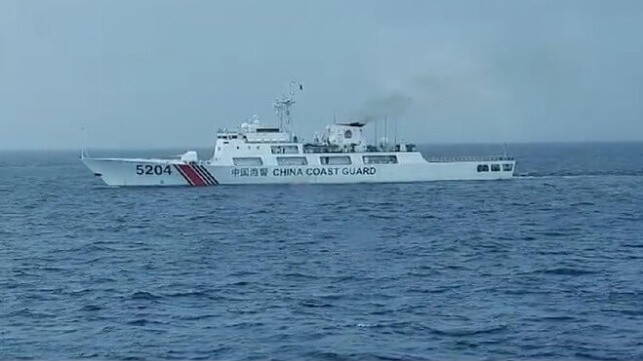Fleet of Chinese Gov't Vessels Loiters in Vietnamese Gas Lease Block

On Wednesday, a flotilla of Chinese vessels entered Vietnamese waters and loitered in a Russian-Vietnamese offshore lease block in a direct challenge to Russian interests, according to AIS tracking conducted by the non-profit South China Sea Chronicle Initiative and other monitors.
The Chinese survey ship Xiang Yang Hong 10 was found transiting within the Vietnamese EEZ at a position about 120 nm off Con Dau, according to Radio Free Asia. The ship was accompanied by two China Coast Guard patrol vessels, pennant numbers 4303 and 5305, and no fewer than seven Chinese maritime militia trawlers. This task force is larger than usual, and Vietnam dispatched a fisheries surveillance ship, the Kiem Ngu 414, to monitor their transit.
According to Reuters, the Chinese research vessel transited at a speed appropriate for surveying, an activity which normally requires the approval of the coastal state.
The area of the transit included a lease block held by Russian oil company Zarubezhneft and state oil firm PetroVietnam. Like earlier Chinese pressure on Rosneft's offshore gas activity off Vietnam, some analysts view the transit as a direct challenge to Russian interests.
"[This is a] test of truth on whether Russia, beholden to [China] due to the war in Ukraine, is a mere second-rate power by succumbing to Beijing's pressure and abandon[ing] its foremost partner in Southeast Asia," said Collin Koh, Research Fellow at the S. Rajaratnam School of International Studies.
Two days earlier, a single Chinese maritime militia vessel approached a joint ASEAN-Indian naval exercise in the Vietnamese EEZ, according to RFA. The vessel passed by the other participants without further incident.

that matters most
Get the latest maritime news delivered to your inbox daily.
China claims much of the Vietnamese EEZ as its own inherent territory under its "nine-dash line" policy. Chinese research vessels and coast guard cutters are frequent visitors to Vietnamese waters, particularly near oil and gas projects. Russian oil major Rosneft abandoned the Vietnamese market after encountering similar pushback.
"China’s tactics in the SCS . . . feature the use of research vessels and their escort fleets to harass gas and oil development activities of other claimants, forcing them to reconsider or abandon their projects. China often deploys several survey vessels, as well as an escort fleet of law enforcement vessels and maritime militia, to planned oil and gas blocks of claimant states in order to deny other claimants access to these waters," explained researcher Viet Hung Nguyen Cao in a 2020 analysis.
